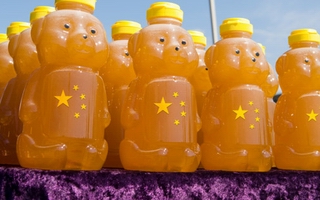 o large honey packers, including one of the nation's biggest - Groeb Farms of Onsted, Mich. - have admitted to purchasing millions of dollars' worth of honey that was falsely labeled.
o large honey packers, including one of the nation's biggest - Groeb Farms of Onsted, Mich. - have admitted to purchasing millions of dollars' worth of honey that was falsely labeled.National Public Radio reports that the goal of this mislabeling, which has been suspected of taking place within the honey industry for some time now, was to "acquire cheap honey from China." This, despite the fact that Chinese honey is subject to strict "anti-dumping" duties the United States imposed in 2008, "after U.S. honey producers complained that Chinese exporters were selling their honey at artificially low prices," NPR said.
To get around those anti-dumping restrictions, however, Chinese exporters began using middlemen to move honey in countries like Indonesia and Vietnam, where it was re-labeled as a local product before being sent on to the U.S. Also, Chinese exporters used another tactic; they would label containers of honey as something else, like rice syrup.
We'll play by the rules this time, we promise
Both companies are now facing criminal charges, but NPR reported that they have struck deals with the government to avoid immediate prosecution:
The companies are promising to play by the rules and to set up programs to ensure that all the honey they buy in the future comes from legitimate sources. Groeb Farms also replaced its senior management last summer.
"This is a huge deal for the industry. This is the first admission by a U.S. packer, the actual user," that they were knowingly importing mislabeled honey, Eric Wenger, chairman of True Source Honey, an industry consortium that has set up an auditing and testing system to guarantee the true origin of honey, told NPR.
The consortium was set up in 2012. Wenger says True Source-certified honey now accounts for at least 25 percent of U.S. honey consumption.
In an email to NPR, Jill Clark, vice president for sales/marketing at Dutch Gold Honey in Lancaster, Pa., which helped establish the program, said that the recent indictments are "just another reason why we felt it necessary to verify ethical sourcing of honey."
In reality, there is much more to this than just dumping of honey. The bottom line has more to do with Chinese food production standards or, rather, the lack of standards.





